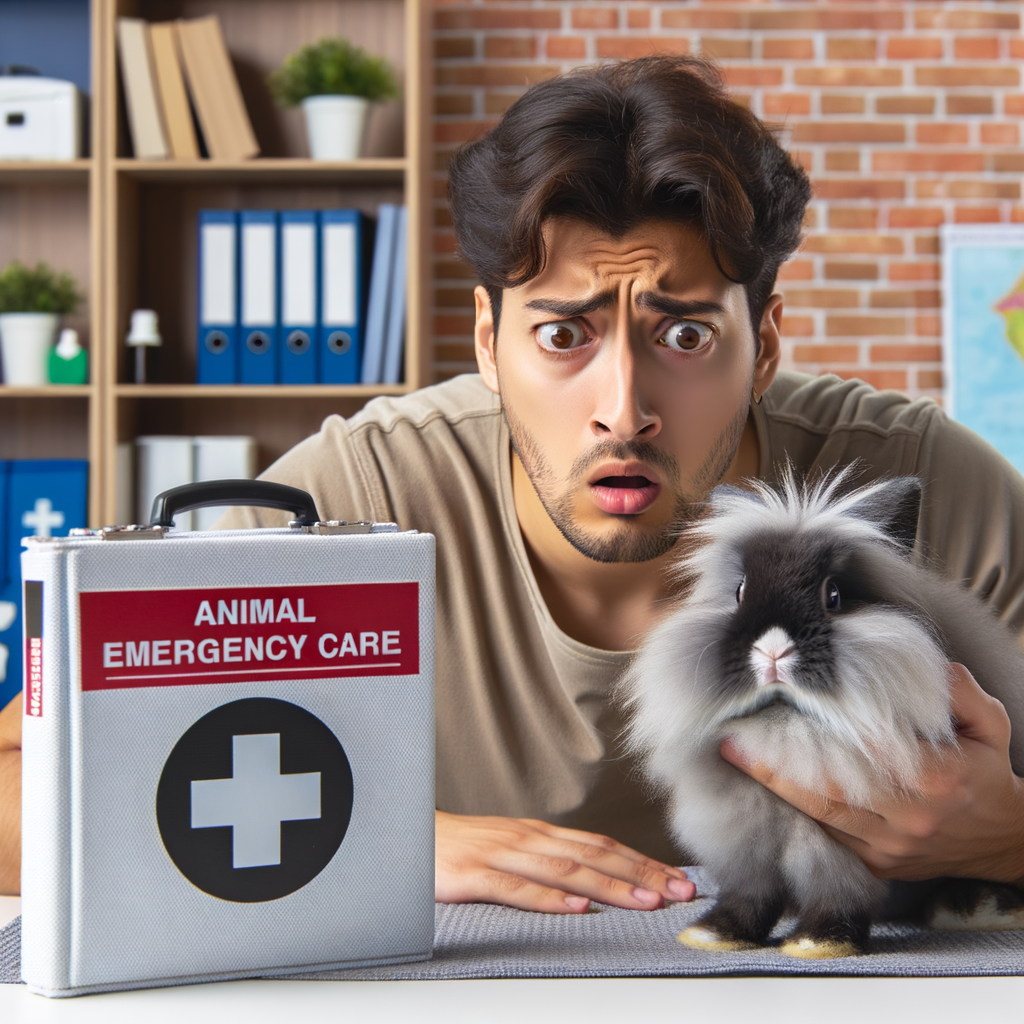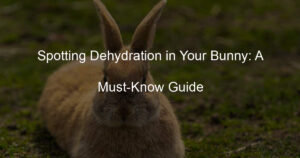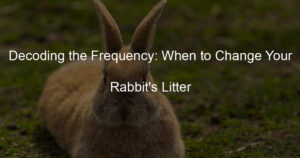
Introduction to Lionhead Rabbit Health
As a Lionhead rabbit owner, it’s crucial to understand the importance of your pet’s health. This knowledge will not only help you provide the best care possible but also ensure a long and happy life for your furry friend. In this section, we will discuss the importance of understanding your Lionhead Rabbit’s health and some common health issues they may face.
- Importance of Understanding Your Lionhead Rabbit’s Health
Understanding your Lionhead rabbit’s health is the first step towards ensuring their well-being. Just like humans, rabbits have unique health needs that must be met for them to thrive. A healthy rabbit is a happy rabbit, and a happy rabbit makes for a happy owner. By understanding your rabbit’s health, you can prevent illnesses, detect problems early, and provide the best care possible.
For instance, did you know that rabbits need a diet high in hay and fresh vegetables to keep their digestive systems running smoothly? Or that they require regular exercise to prevent obesity and related health issues? These are just a few examples of the kind of information you can learn when you take the time to understand your rabbit’s health.
- Common Health Issues in Lionhead Rabbits
Despite our best efforts, sometimes our Lionhead rabbits can still fall ill. Some of the most common health issues in Lionhead rabbits include dental problems, digestive issues, and respiratory infections.
Dental problems are common in rabbits because their teeth continuously grow throughout their lives. If their diet doesn’t provide enough roughage to wear down their teeth, they can develop painful conditions like overgrown teeth. Digestive issues, on the other hand, can occur if rabbits are fed a diet low in fiber or high in sugar. Lastly, respiratory infections can be caused by bacteria, viruses, or even a dusty environment.
By understanding these common health issues, you can take steps to prevent them and keep your Lionhead rabbit healthy and happy. Remember, prevention is always better than cure!
Rabbit Emergency Care: Preparing for the Unexpected
When it comes to our furry friends, emergencies can happen at any time. It’s crucial to understand what constitutes a rabbit emergency and how to handle it. Let’s delve into the details.
Understanding Rabbit Emergencies
Just like humans, rabbits can also face health emergencies. Recognizing these emergencies is the first step towards providing your rabbit with the necessary care.
- Defining what constitutes a rabbit emergency
- Common emergencies in rabbits
- Gastrointestinal (GI) stasis: This is a serious condition where a rabbit’s digestive system slows down or stops completely. Symptoms include loss of appetite, lethargy, and small or no fecal output.
- Heatstroke: Rabbits are very sensitive to heat. If they are exposed to high temperatures, they can suffer from heatstroke, which can be fatal.
- Injuries: These can result from accidents like falls or fights with other animals. Injuries can range from minor cuts to severe fractures.
- Respiratory problems: If your rabbit is breathing heavily, has a runny nose, or is sneezing frequently, it could be a sign of a respiratory problem, which needs immediate attention.
An emergency in rabbits can be defined as any sudden or unexpected situation that poses a serious threat to their health or life. This could range from physical injuries, sudden changes in behavior, to severe illnesses. It’s important to note that rabbits are good at hiding their pain, so you need to be observant and act quickly when you notice something unusual.
Rabbits can encounter a variety of health emergencies. Some of the most common ones include:
Understanding these emergencies can help you take quick action and possibly save your rabbit’s life. Remember, when in doubt, always consult with a vet.
Emergency Response for Rabbits
When it comes to our furry friends, emergencies can happen at any time. It’s crucial to know how to respond when your rabbit is in distress. Here, we will discuss the steps to take when a rabbit emergency occurs and the importance of staying calm and collected.
- Steps to Take When a Rabbit Emergency Occurs
- Assess the Situation: Try to understand what’s happening. Is your rabbit injured? Are they sick? This will help you decide the best course of action.
- Contact a Vet: If the situation seems serious, contact your vet immediately. They can provide guidance and help you decide if you need to bring your rabbit in for treatment.
- Provide Comfort: Keep your rabbit comfortable and safe until you can get them the help they need. This might mean moving them to a quiet, warm place or offering them their favorite food.
- Importance of Staying Calm and Collected
First, it’s essential to identify the signs of an emergency. These can include unusual behavior, loss of appetite, or physical distress. Once you’ve identified an emergency:
In an emergency, your rabbit will likely be scared and confused. They will look to you for comfort and reassurance. If you panic, your rabbit may become more stressed, which can make the situation worse. Try to stay calm and collected. This will help your rabbit stay calm too, and it will enable you to think clearly and make the best decisions for your pet’s health.
Remember, the best way to handle an emergency is to be prepared. Know the signs of distress in your rabbit and have a plan in place for how to respond. With the right knowledge and preparation, you can ensure your rabbit gets the help they need when they need it most.
Foreign Object Ingestion in Rabbits: A Comprehensive Guide
As a rabbit owner, it’s essential to understand the risks and dangers associated with foreign object ingestion. This comprehensive guide will provide you with the knowledge and tools necessary to handle such situations effectively.
What to do if Rabbit Eats Foreign Object
When your rabbit ingests a foreign object, it can be a stressful and frightening situation. However, knowing the right steps to take can make all the difference. Here’s what you need to do:
- Immediate steps to take
- When to contact a vet
If you suspect that your rabbit has eaten a foreign object, the first thing to do is to remove any remaining parts of the object from your rabbit’s reach. This will prevent further ingestion. Next, monitor your rabbit closely for any signs of distress, such as loss of appetite, lethargy, or changes in behavior. It’s also important to check your rabbit’s droppings to see if the object has passed through.
If your rabbit shows signs of distress or if the object does not pass within 24 hours, it’s time to contact a vet. Foreign object ingestion can lead to serious complications like gastrointestinal blockages, which require immediate medical attention. Remember, it’s always better to be safe than sorry when it comes to your rabbit’s health.
In conclusion, being prepared and knowing what to do in case of foreign object ingestion can help ensure your rabbit’s health and well-being. Always keep a close eye on your rabbit and its environment to prevent such incidents from happening in the first place.
Rabbit Ingestion Issues: Preventing Foreign Object Ingestion
One of the most common health issues rabbits face is the ingestion of foreign objects. This can be quite dangerous and lead to serious complications. However, there are measures you can take to prevent this from happening. Let’s take a look at two key strategies: rabbit-proofing your home and providing safe toys and chews for your rabbit.
- How to Rabbit-Proof Your Home
- Keep small objects, especially those made of plastic or rubber, out of your rabbit’s reach.
- Ensure that all electrical cords are covered or hidden. Rabbits can easily chew through these, leading to serious injury.
- Use baby gates or playpens to limit your rabbit’s access to certain areas of your home.
- Regularly check your rabbit’s environment for any potential hazards.
- Safe Toys and Chews for Rabbits
- Wooden toys: These are great for rabbits as they are durable and safe to chew. Just make sure the wood is untreated and non-toxic.
- Hay-based toys: Hay is a rabbit’s main diet and they love to chew on it. Hay-based toys can provide hours of entertainment and are completely safe if ingested.
- Cardboard boxes: These are safe for rabbits to chew on and can also provide a fun hiding place.
- Mineral chews: These can help keep your rabbit’s teeth in good shape. Just make sure to choose one that is specifically designed for rabbits.
Rabbit-proofing your home is a crucial step in preventing foreign object ingestion. Rabbits are naturally curious and love to chew on things. This can lead to them ingesting harmful objects. To rabbit-proof your home, you should:
Providing safe toys and chews for your rabbit is another effective way to prevent foreign object ingestion. Rabbits need to chew to keep their teeth healthy and to satisfy their natural instincts. Here are some safe options:
In conclusion, by taking these preventative measures, you can significantly reduce the risk of your rabbit ingesting a foreign object. Remember, a safe environment and appropriate toys and chews are key to your rabbit’s health and happiness.
Lionhead Rabbit Care: Handling Rabbit Emergencies
When it comes to caring for your Lionhead Rabbit, emergencies can sometimes occur. It’s essential to know how to handle these situations to ensure your rabbit’s health and safety. Let’s take a look at a case study that illustrates this.
Lionhead Rabbit Emergency: Case Study
Understanding how to handle emergencies is crucial for any Lionhead Rabbit owner. Let’s explore a real-life example of a rabbit emergency to better understand the steps involved.
- Example of a Lionhead Rabbit swallowing a foreign object
- Steps taken to resolve the issue
Meet Fluffy, a two-year-old Lionhead Rabbit. One day, Fluffy’s owner noticed that he was not eating his food and seemed lethargic. Upon closer inspection, she saw a small piece of plastic near his cage. Fluffy had swallowed a foreign object, a common emergency in rabbits.
Fluffy’s owner acted quickly. She immediately contacted her vet, who advised her to bring Fluffy in for an examination. The vet performed an X-ray, which confirmed the presence of the foreign object. Fluffy underwent a minor surgery to remove the object. After a few days of rest and careful monitoring, Fluffy was back to his usual self.
This case study highlights the importance of quick action and professional veterinary care in handling rabbit emergencies. When in doubt, always consult with a vet to ensure your Lionhead Rabbit’s health and safety.
Key Takeaways: Lionhead Rabbit Health and Safety
- Importance of Regular Vet Check-ups
- Keeping Your Rabbit’s Environment Safe
Regular vet check-ups are crucial for your Lionhead Rabbit’s health. These visits allow the vet to detect any potential health issues early, increasing the chances of successful treatment. Regular check-ups also provide an opportunity for your vet to monitor your rabbit’s weight and diet, ensuring they are getting the right nutrients for optimal health. Remember, prevention is always better than cure.
Creating a safe environment for your Lionhead Rabbit is just as important as regular vet visits. This means ensuring their living space is free from hazards such as sharp objects, toxic plants, and harmful chemicals. It’s also important to provide them with plenty of space to hop around and exercise. A safe and stimulating environment will help keep your rabbit happy, healthy, and free from stress.
| Key Takeaway | Why It’s Important |
|---|---|
| Regular Vet Check-ups | Early detection of potential health issues, monitoring of weight and diet. |
| Safe Environment | Prevention of injuries and stress, provision of exercise and stimulation. |
Conclusion: Ensuring Your Lionhead Rabbit’s Health and Happiness
As we come to the end of this comprehensive guide, let’s take a moment to recap the essential points and share some final thoughts on Lionhead Rabbit care.
- Recap of emergency response for rabbits
- Final thoughts on Lionhead Rabbit care
Remember, the key to handling any rabbit emergency is preparedness. Always have a first-aid kit ready, and ensure you’re familiar with your rabbit’s normal behavior to spot any unusual changes. In case of foreign object ingestion, remember to never attempt to remove the object yourself. Instead, seek immediate veterinary care. Regular health checks and a balanced diet can help prevent many health issues.
Providing the best care for your Lionhead Rabbit involves more than just handling emergencies. It’s about creating an environment where your rabbit can thrive. This includes providing a spacious and clean living area, a balanced diet, and plenty of social interaction. Remember, a happy rabbit is a healthy rabbit.
By following the guidelines outlined in this guide, you can ensure your Lionhead Rabbit’s health and happiness. After all, these adorable creatures depend on us for their well-being. Let’s make their lives as joyful and comfortable as possible.




